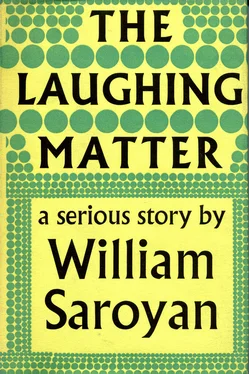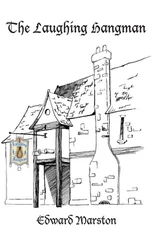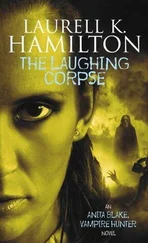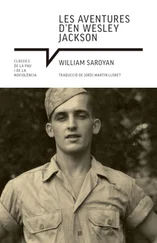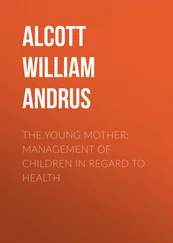Eva Nazarenus sat between Cody Bone and Rex Nazarenus, a man on one side, a boy on the other. Another man, her father, sat in the seat behind her.
She was alone with three men, three boys, going in a car down a hot road with irrigation ditches on each side of the road, each ditch choked with grass of all kinds, beyond each ditch vines or trees set out in perfect order, so that every time you noticed them there was a whole big design to see, and then any number of smaller designs.
This was another place, with another way about it. The way here was sun, and early in the morning birds. The way here was uncrowded, planted with trees instead of people. The trees stayed where they were. They stayed so long that if a boy wanted to climb one all he had to do was what her brother Rex had done. Get up into it and go—go, and then far up in it, reach for ripe figs, and let them fall from his hands to hers. She didn’t catch many of them. The ones she did catch smashed a little, but she could eat them just the same, and she had eaten three. The others she had put aside for her father or her mother or for the man who’d lost his mother, in case he came by.
She had heard of Clovis long ago, of Dade Nazarenus and Clovis. Here she was in this place, in an automobile, going to watch Red do something.
What was Red going to do? It must be something special. The man beside her must be special, too. She didn’t know him, but she knew he was nice. Red was quiet beside her at first, and then, seeing a rabbit run across the road, stopped being quiet.
“Rabbit, Papa!” he said. “Did you see the rabbit? Now, why is he the way he is?”
Eva listened to her father going to the trouble of trying to answer Red’s question, the way he always did, always trying to answer Red’s questions, and hers, and Mama’s, taking every question seriously, thinking about it, trying to give the right answer. Out of a wish to comfort him, she got up and climbed over the front seat to be with him.
She had nothing to say while doing this, but he was there, as she knew he’d be, ready to help her across the seat. He was still giving Red the answer, but as he went on talking, he looked into her eyes, then drew her to him. She put her arms around him and squeezed with all her might because he was the one, he was the best, better than all the rest of them put together, he was the one who truly understood and loved her, the one who smelled the way she knew a man should smell, the one who had the face and hands and way of her own man. She squeezed, and then scrambled away to sit quietly beside him, her hands folded on her lap, sitting all the way back in the seat, being there but no longer listening to anything.
Cody Bone had known Dade Nazarenus from the time, twenty years ago, he’d come to Clovis in a Ford roadster with the top down and driven around, looking for a vineyard. At last he’d decided on Orvall Albee’s extra vineyard, the sixty acres Orvall had picked up for almost nothing. Dade had come from a town in New Jersey. He knew nothing about vineyards, nothing about land values, but he wanted a place on which to put a house, he liked Clovis, he liked the countryside, and he liked Albee’s sixty acres. He bought the place—got robbed, of course—put a fine house on it, fooled around a couple of years at running the place alone except for the usual help at crop time, and then went off somewhere for a month. When he came back he had a girl with him who was small and dark and seemed to be in love with him. She was a city girl with intelligent eyes and a swift and impatient eagerness to get to the point of things, or to have fun forsaking the point if something wasn’t interesting. Everybody who saw her felt glad to see her. She could be nicer than any other woman in Clovis one minute, and the next be bored to death with everybody. She loved flowers and had Dade call in a nurseryman to set out a whole garden of them, all kinds of roses, lilac trees, oleanders, and a lot of other stuff. Her name was Beatrice, but Dade called her Trix. Cody had heard long ago that Dade had a younger brother teaching at a university somewhere, but both times this brother, years ago, had come to visit Dade, Cody had missed him. He’d seen Dade and Trix, the two boys and the little girl, together for years, and he’d believed nothing in the world could ever break up what Dade and Trix had together. The next thing he knew, though, Dade was living on the vineyard alone. Trix and the kids were gone, and Dade didn’t want to talk about it.
And then Cody had seen Dade’s brother at last, standing in front of the station with Warren Walz, and he’d instantly recognized him. His son stood beside him, looking like his father and like his father’s older brother. Cody had gone home and he had told his youngest son, Bart, about Dade’s brother, and his son, called Red.
“The brothers look alike, stand alike, walk alike, talk alike,” he said. “He’s a professor at Stanford. I’m going to give his boy a ride in the locomotive. He’s got the watch-ingest eyes I’ve ever seen. I know he’s scared, but I know he wants to ride, too.”
Bart had gotten back from Fresno just as Cody was getting to bed, the man and boy occupying the house alone, the boy’s mother dead ten years, his brothers and his sister married and living in Los Angeles and San Francisco.
“Well,” the boy said, “I met him, too.”
“Who?” Cody said.
“Dade’s brother,” Bart said. “On my way in I saw somebody crossing a vineyard. I drove around, came back, saw him stumble and fall, get up, stumble and fall again, and not get up. I had no idea who it was. I drove up, stopped, and went to see who it was. I drove him to Fresno. He seemed in a bad way.”
“Drunk?”
“I don’t think it was from drink. He’d been drinking, though.”
“Where’d you leave him?”
“Outside the Public Library. He went to the bar on the corner.”
“What did he say?”
“Said he didn’t want to talk.”
“He seemed all right this afternoon. Didn’t he say anything?”
“Said his name when we stopped,” Bart said. “Said it to thank me for the ride.”
“Fight, I guess,” Cody said. “Dade and Trix were always fighting. They’re quick to fight. The whole thing’ll be forgotten in the morning.”
“I never saw anybody in such a bad way,” Bart said. “I was scared.”
“Nothing,” Cody said. “They’re swift, that’s all.”
“I guess so,” Bart said. “Seemed like a lot, though.”
“I’ll drive past in the morning and stop for a moment,” Cody said.
In the morning Bart said, “It was something . I don’t know what , but it was something. I think the reason I was scared is that I felt he might fall dead or even kill somebody, from anger.”
“Anger?”
“Well, rage would be more like it. It wasn’t funny. It was a man in a killing rage.”
Now, driving with the man and his kids to the depot and freight yards of Clovis, Cody Bone listened to the talk of the father and the son, and knew from the man’s way of speech that Bart had not been far from the truth. Cody didn’t want to pry, but when his car was almost struck by one that had not stopped at a stop sign and Cody had had to slam on the brakes, throwing everybody around a little, he said, “Well, life is full of surprises, isn’t it?”
He had not, as a matter of fact, meant the remark to start anything, but after it had been made and Evan Nazarenus did not treat it insignificantly by saying quickly almost anything at all, Cody knew that Evan had been in a bad way, and was still.
“I mean,” Cody went on quickly, “there’s no telling when the unexpected is liable to happen, like that fool boy back there nearly smashing into us. Well, he didn’t make it, so we’re all set for the locomotive ride, after all.”
Читать дальше
